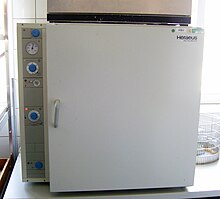sterilizer
A sterilizer is a device for killing pathogens such as bacteria ( sterilization ), usually by heating them under pressure and using steam . These devices are called steam sterilizers or autoclaves . Such devices are mainly used in the medicine used surgical instruments to be sterilized and other instruments or to disinfect . The devices are also used in biotechnology for the sterilization of liquid culture media or glass devices. For steam sterilization with an autoclave, the standard procedure of the German Pharmacopoeia prescribes a temperature of at least 121 ° C at 1 bar overpressure (= 2 bar abs.) For 20 minutes. Programs with 134 ° C at 3 bar are also common, especially for glassware without liquids and instruments. With hot air sterilization, i.e. sterilization with dry heat, higher temperatures of over 180 ° C to 250 ° C and a minimum sterilization time of 30 minutes are necessary. These devices are used to sterilize preparation tools and, in some cases, also smaller glass devices without plastic components. Hot air sterilizers are easier to use (no pressure build-up or evaporation of the water), and as a result, the operating costs are lower.
The difference in results between sterilization and disinfection is achieved by different exposure times and temperatures of the sterilization medium (pressurized steam) on the items to be sterilized.
In order to ensure the achieved result (sterility), the items to be sterilized are wrapped in vapor-permeable packaging.
In order to ensure the operational safety of the devices and the success of the sterilization, regular inspections ( TÜV ) and, depending on the device, ongoing functional tests, for example using spondi strips, soil spore samples or a Bowie-Dick test, are prescribed.
Thermolabile items to be sterilized are sterilized using a low-temperature sterilization process. This includes B. the LTSF process (low temperature steam with formaldehyde ), which works at a sterilization temperature of 50–78 ° C with a sterilization time of 30–120 minutes.
See also
Individual evidence
- ^ Rainer Klischies: Medical Microbiology , page 204.

